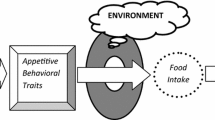Abstract.
Obesity is a multifactorial and heterogeneous condition that results from alterations of various genes, each having a partial and additive effect. The inheritance pattern of obesity is thus complex, and environmental factors play an important role in promoting or delaying its development. The identification of susceptibility genes and genetic variants for obesity requires various methodological approaches. Obesity is classified into three main categories on the basis of genetic etiology: monogenic, syndromic, and polygenic obesity. Here we review monogenic and syndromic obesity. We also review the linkage analysis studies followed by the candidate gene approaches and genome-wide association studies. Identification of the underlying genetic causes of obesity will likely provide a basis both for the development of new therapeutic agents and for the personalized prevention of this condition.
Similar content being viewed by others
Author information
Authors and Affiliations
Corresponding author
Additional information
Received 2 October 2007; received after revision 15 November 2007; accepted 19 November 2007
Rights and permissions
About this article
Cite this article
Ichihara, S., Yamada, Y. Genetic factors for human obesity. Cell. Mol. Life Sci. 65, 1086–1098 (2008). https://doi.org/10.1007/s00018-007-7453-8
Published:
Issue Date:
DOI: https://doi.org/10.1007/s00018-007-7453-8




